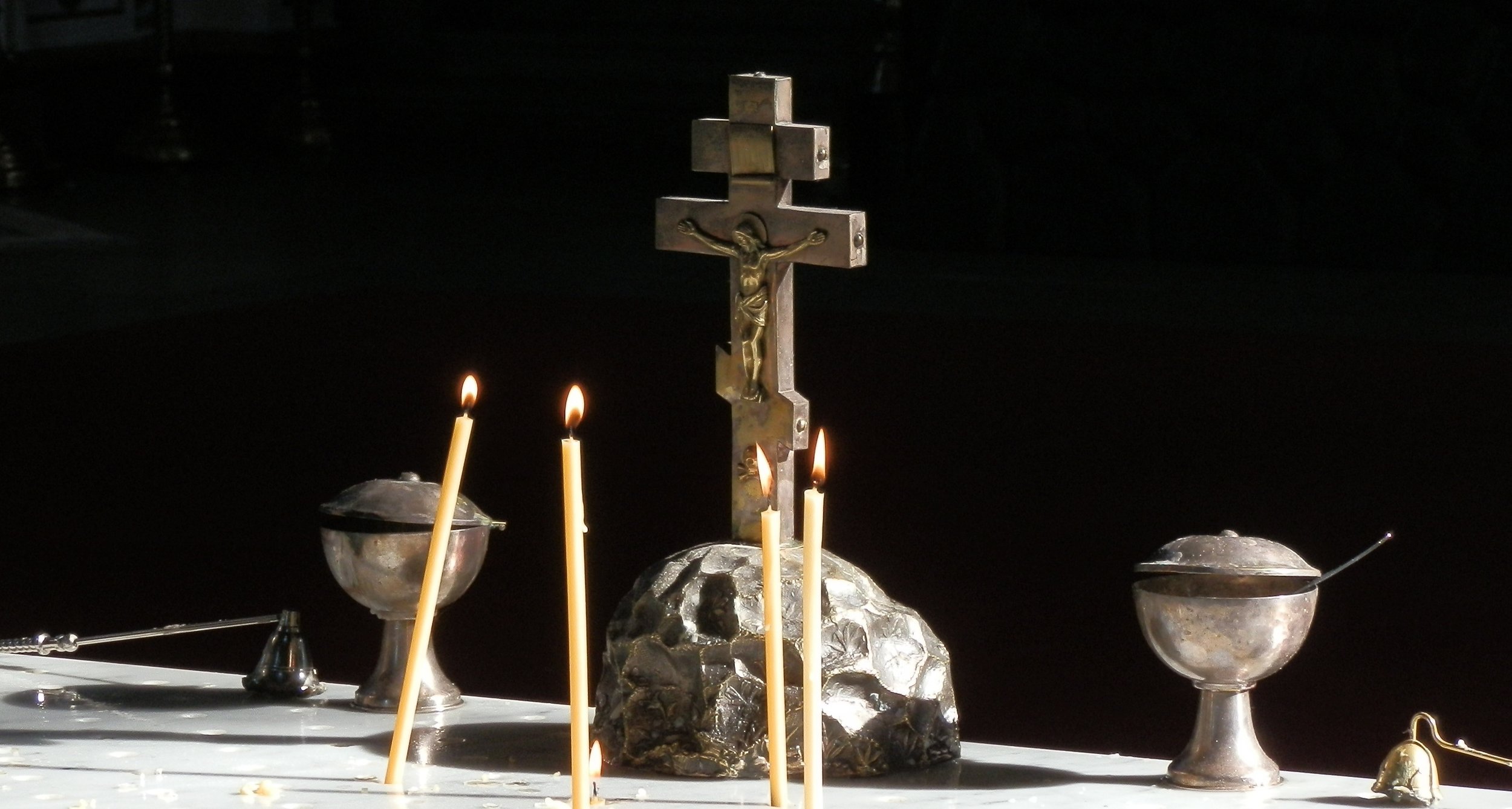Healing Atonement
The Epistle to Diognetus (late 1st to 2nd century)
An old clay oil lamp from Nazareth, Israel. Photo credit: Olivia Armstrong.
The Epistle to Diognetus, or the Epistle of Mathetes to Diognetus
The Epistle to Diognetus In chapters 7 and 8, when the Epistle of Diognetus explains the character of God and God’s attitude towards us, the author says:
“as seeking to persuade, not to compel us; for violence has no place in the character of God… He was always of such a character, and still is, and will ever be, kind and good, and free from wrath, and true, and the only one who is [absolutely] good” (chapters 7, 8)
Traditionally, penal substitution and penal satisfaction depend on understanding God’s wrath as equal and opposite to His love. It is certainly remarkable that the Epistle says God is “free from wrath,” and only “kind and good.” This means that God’s motivation in the atonement cannot be to “propitiate” His own “wrath” or “retributive justice.” For such a motivation would entail “violence,” which the Epistle rules out. The word “propitiate” does not occur in the Epistle. The word “wrath” appears only here, and is ruled out as a motivation of God.
Furthermore, the Augustinian tradition as formulated by the Protestant Reformers do, in fact, understand Christ as coming to “compel us,” not simply to persuade. That is because the Augustinian tradition denies the divine energies, posits a fairly radical separation between “nature” and “grace,” and also denies that human free will is a partnership (synergia) with God to walk in the “likeness” of God — that is, to shape and perfect in love our human nature and desires. Augustine posited that God must act unilaterally upon us (monergia). In such a framework, if God did not enact violence upon Christ, motivated by wrath, and compel us to believe, God would not “save” anyone from His own wrath.
The author of the Epistle to Diognetus, however, does not share that later Augustinian framework. The stated divine motivation lends itself quite easily to the restorative justice envisioned by the Jewish law, in Exodus 21:18 - 19 and 22:1 - 14, where offenders participate in the restoration of the harm and damage they caused. In this case, Jesus as the supreme Hebrew judge will demand people's participation in the healing of the damage they have caused -- to their own human nature. That was and is his motivation (e.g. Deuteronomy 10:16). He can do this while being “kind and good” and “free from wrath,” because God calls for participation in His own kindness and goodness and love. There is no spectating with God, which is why the author in ch.10 says we must become “imitators of God.” Then, in ch.12, the author says, like Isaiah 58, that God wants each of us to be a fruitful garden, and we must receive good things -- virtues of the Word by the Spirit -- into ourselves, and not vices or lies. But for people who resist and refuse Jesus, that very call to participate will be the torment. This is why the Epistle to Diognetus teaches Medical, not Penal, Substitutionary Atonement. It is rooted in the author’s understanding of the character and motivations of God.
Chapter 9 contains this explanation for Jesus’ life, death, and resurrection as saving:
“As long then as the former time endured, He permitted us to be borne along by unruly impulses, being drawn away by the desire of pleasure and various lusts. This was not that He at all delighted in our sins, but that He simply endured them; nor that He approved the time of working iniquity which then was, but that He sought to form a mind conscious of righteousness, so that being convinced in that time of our unworthiness of attaining life through our own works, it should now, through the kindness of God, be vouchsafed to us; and having made it manifest that in ourselves we were unable to enter into the kingdom of God, we might through the power of God be made able. But when our wickedness had reached its height, and it had been clearly shown that its reward, punishment and death, was impending over us; and when the time had come which God had before appointed for manifesting His own kindness and power, how the one love of God, through exceeding regard for men, did not regard us with hatred, nor thrust us away, nor remember our iniquity against us, but showed great long-suffering, and bore with us, He Himself took on Him the burden of our iniquities, He gave His own Son as a ransom for us, the holy One for transgressors, the blameless One for the wicked, the righteous One for the unrighteous, the incorruptible One for the corruptible, the immortal One for those who are mortal. For what other thing was capable of covering our sins than His righteousness? By what other one was it possible that we, the wicked and ungodly, could be justified, than by the only Son of God? O sweet exchange! O unsearchable operation! O benefits surpassing all expectation! That the wickedness of many should be hid in a single righteous One, and that the righteousness of One should justify many transgressors! Having therefore convinced us in the former time that our nature was unable to attain to life, and having now revealed the Saviour who is able to save even those things which it was [formerly] impossible to save, by both these facts He desired to lead us to trust in His kindness, to esteem Him our Nourisher, Father, Teacher, Counsellor, Healer, our Wisdom, Light, Honour, Glory, Power, and Life, so that we should not be anxious concerning clothing and food.”
Brian Arnold, Penal Substitution in the Early Church (The Gospel Coalition, April 13, 2021) argues that this was penal substitution and penal satisfaction as in the teachings of the traditional Protestant Reformers like Calvin. He says: “this paragraph is the single best description of penal substitution in the first few centuries, and quite possibly in the history of the church.” Reading ch.9, he says, “this paragraph is the single best description of penal substitution in the first few centuries, and quite possibly in the history of the church.” To add to his case, the Epistle to Diognetus also says that “what is truly death is reserved for those who shall be condemned to the eternal fire” (ch.10). Interpreted in a certain way, that could also support PSA.
In isolation, it could sound that way. But only in isolation. Brian Arnold is cherry-picking. The Epistle uses a medical framework, has a focus on human nature, sees human sinfulness as a deviation from God’s intended journey of human being-becoming, views Jesus’ work of atonement and salvation as about human nature, requiring our participation and not a unilateral judicial declaration as in PSA, and says God’s fire is God’s ongoing demand that we participate in His restoration of our human nature in Jesus. That is the only way to be consistent with God’s character and motivations as stated in chapter 7 and 8, which of course it is. The Epistle is not an amalgamation of maxims that could lean this way or that, or could be pulled apart into various “motifs.”
The Epistle to Diognetus on God’s Motivations
When the Epistle of Diognetus explains the character of God and God’s attitude towards us, the author says:
“as seeking to persuade, not to compel us; for violence has no place in the character of God… He was always of such a character, and still is, and will ever be, kind and good, and free from wrath, and true, and the only one who is [absolutely] good” (Epistle to Diognetus 7, 8)
Now, that makes us pause and ask questions about God’s use of violence in the Old Testament. But let me set that aside for the moment and work with what the Epistle itself says, which is focused on Christian ministry.
“Not to compel us” refers, in context, to Christian conversion. The Protestant Reformers, carrying forward the later Augustine’s double predestination, do in fact understand Christ as coming to “compel us,” not simply to persuade. That is because the Augustinian tradition is ignorant of the divine energies teaching of the Eastern Orthodox (kind of a very personal version of Western divine providence), posits a fairly radical separation between “nature” and “grace,” and also denies that human free will is a partnership (synergia) with God to walk in the “likeness” of God — that is, to shape and perfect in love our human nature and desires. The older Augustine posited that God must act unilaterally upon us (monergia). The Catholic Church denied that Augustine meant this in local councils. But Luther and Calvin then drew upon Augustine’s idiosyncrasies to make conversion to Christ an act of divine monergic compulsion.
“Ever kind and good, and free from wrath.” Traditionally, penal substitution and penal satisfaction depend on understanding God’s wrath as equal and opposite to His love. It is certainly remarkable that the Epistle says God is “free from wrath,” and only “kind and good.” This means that God’s motivation in the atonement cannot be to “propitiate” His own “wrath” or “retributive justice.” Moreover, such a motivation would entail “violence” done to both Jesus and people, which the Epistle rules out.
The stated divine motivation “kind and good” and “free from wrath” lends itself quite easily to the restorative justice envisioned by the Jewish law, in Exodus 21:18 - 19 and 22:1 - 14, where offenders participate in the restoration of the harm and damage they caused. In this case, Jesus as the supreme Hebrew judge will call people to participate in the healing of the damage they have caused -- first and foremost to their own human nature. That was and is his motivation (e.g. Dt.10:16). He can do this while being “kind and good” and “free from wrath,” because God calls for participation in His own kindness and goodness and love.
The startling fact is that those who hold to both Lutheran-Calvinist monergism and PSA would reject the Epistle to Diognetus. For they say that if God did not enact violence upon Christ, motivated by retributive wrath, and then compel us to believe it, then God would not save anyone from Himself.
The Epistle to Diognetus on Christ, Atonement, and Divine Justice
Chapter 9 therefore deserves a more careful reading. Chapter 9 contains an elegant explanation for Jesus’ life, death, and resurrection as saving. The author first summarizes human history and the condition of human relations and nature. Basically, God waited to send Christ until two conditions were met. The first condition was that the Gentiles became discouraged and disgusted with themselves, which sounds much like Romans 1:21 - 32 and Ephesians 4:17 - 19 in abbreviated form:
“As long then as the former time endured, He permitted us to be borne along by unruly impulses, being drawn away by the desire of pleasure and various lusts.” (ch.9)
The second condition was the readiness of enough Jews under the Sinai covenant to be convinced of Christ to love both Jews and Gentiles. For I think the “mind conscious of righteousness” refers to the Jewish people, which was the topic of chapters 3 and 4:
“This was not that He at all delighted in our sins, but that He simply endured them; nor that He approved the time of working iniquity which then was but that He sought to form a mind conscious of righteousness, so that being convinced in that time of our unworthiness of attaining life through our own works, it should now, through the kindness of God, be vouchsafed to us; and having made it manifest that in ourselves we were unable to enter into the kingdom of God, we might through the power of God be made able.” (ch.9)
I think it’s important that the Epistle says God “simply endured” our sins. God did not “store up retributive wrath” as a looming threat against us. God’s delay, as it were, had to do with at least some humans becoming “conscious of righteousness,” which again I take to be Israel within the Sinai covenant. The phrase, “life through our own works,” has to do with the Sinai covenant and the biblical story of “restoration from exile” to the garden of God’s life. Thus, it’s also important that our entrance into the kingdom of God is by the power of God making us able to live within Jesus’ life and works and partner with him. It is not the exhausting of divine retribution.
Then, the Epistle says, God sent His Son to be among us:
“But when our wickedness had reached its height, and it had been clearly shown that its reward, punishment and death, was impending over us; and when the time had come which God had before appointed for manifesting His own kindness and power, how the one love of God, through exceeding regard for men, did not regard us with hatred, nor thrust us away, nor remember our iniquity against us, but showed great long-suffering, and bore with us, He Himself took on Him the burden of our iniquities, He gave His own Son as a ransom for us, the holy One for transgressors, the blameless One for the wicked, the righteous One for the unrighteous, the incorruptible One for the corruptible, the immortal One for those who are mortal.” (ch.9)
John Calvin famously said, “God hated us while He loved us.” But the Epistle to Diognetus says God “did not regard us with hatred.” Once again, this is important as a statement of divine motivation. The “punishment and death” was not a looming threat from God. It was existential, as the quality of human life and society has already been described in the Epistle. Sin was its own reward, and sin was its own punishment.
What, then, does the Epistle mean when it describes what Jesus accomplished? The author’s primary language is that of Isaiah who envisioned the Servant-messiah as both the sin-offering goat and the scapegoat: he would be the sin-bearer that took the sin far away and the sin offering by which God took the sin into Himself and gave back life (Isa.52:13 - 53:12). “The burden of our iniquities” is primarily the struggle Jesus had with the corruption of sin in our, and his own, fallen human nature. It refers to his faithful life and death, not simply his death. “He gave His own Son a ransom for us” refers to God sending Jesus into the world to accomplish a deliverance at the cost of him entering and suffering the experiences of fallenness, exile, empire, and death. The phrasing of this one “for” the many does not have a PSA meaning. It is simply the biblical language of gift: this gift of the Son was “for” all humanity.
The “sweet exchange” is that the Son shared in our fallen human nature, that we might share in his healed human nature. In Isaiah’s Servant language, the Servant shared in Israel’s exile, that Israel might share in his restoration from exile. There was, in that sense, a penalty Jesus shared in, but the substitutionary dynamic was not a penalty shifting over from Israel to him, but Jesus substituting himself in for Israel to fulfill God’s expectation that someone render full obedience and faithfulness to heal human nature. Therefore, I maintain that Isaiah himself could have only understood the atonement as a medical substitution – as providing an opportunity for us to share in the healing of human nature, to become righteous, incorruptible, immortal as God intended from the garden of Eden. Elsewhere I have discussed the patristic preference for the Greek Septuagint Text (LXX) of Isaiah, and the questions it raises for the Masoretic Text (MT). Critically, in the very important phrase in Isaiah 53:10, the LXX reads, “And the Lord desired to purify/cleanse him from his wound” – which is quite different than the Hebrew MT. I seek to explain both Greek and Hebrew textual variants as rooted in Isaiah’s understanding of the Jewish sacrificial system. See here for all our blog posts exegeting Isaiah 53.
The Epistle continues to discuss the Son using what the Protestant Reformers considered to be legal-penal, forensic language:
“For what other thing was capable of covering our sins than His righteousness? By what other one was it possible that we, the wicked and ungodly, could be justified, than by the only Son of God? O sweet exchange! O unsearchable operation! O benefits surpassing all expectation! That the wickedness of many should be hid in a single righteous One, and that the righteousness of One should justify many transgressors! Having therefore convinced us in the former time that our nature was unable to attain to life, and having now revealed the Saviour who is able to save even those things which it was [formerly] impossible to save, by both these facts He desired to lead us to trust in His kindness, to esteem Him our Nourisher, Father, Teacher, Counsellor, Healer, our Wisdom, Light, Honour, Glory, Power, and Life, so that we should not be anxious concerning clothing and food.” (ch.9)
The Protestant Reformers interpreted language like “covering our sins” and “wickedness be hid” as supporting a legal, penal atonement, and a legal, forensic definition of “justification” and the view of the legal imputation of “righteousness.” In other words, in that legal paradigm, God the Father views us through Jesus as a type of lens, but without actually changing who we are, as related to what these terms indicate.
However, the Epistle of Diognetus says that the concern was about human nature itself. “Having therefore convinced us in the former time that our nature was unable to attain to life.” That is an ontological-medical concern. It fits with and explains the explanation in ch.11 as to why people in hell still choose to be there: “when you shall fear what is truly death, which is reserved for those who shall be condemned to the eternal fire, which shall afflict those even to the end that are committed to it” (emphasis mine). What accounts for people being committed to being in hell? Only an explanation rooted in human nature as conditioned by our choices – that is, of human being and becoming.
So how does the language of law relate to the language of human nature and being-becoming? Is it in the sequence envisioned by, say, many Calvinists today? That the legal forgiveness and justification language has to come first by us understanding Christ as a penal substitute? And then the sanctification language comes in only after that as an experience of growing in Christ-likeness? I have already observed that the Epistle explicitly rejects the presuppositions needed for a sequence like that. So I argue not.
In Scripture, “justification” stands in relation to the Sinai covenant, a point which is virtually uncontested among scholars. What is contested is the meaning of the Sinai covenant itself, and God’s purpose for it. I have sketched out above in my comments on Scripture that I believe the Sinai covenant was a health regimen of sorts, in a medical framework – meaning, the Sinai covenant indicated how it was that humans might stand on the other side of the great exile, and be restored (Dt.30:1 - 6).
Patristic writers attest to the Sinai covenant serving a medical purpose to restore as much health to Israel as possible, so that they might even better recognize Jesus. Irenaeus of Lyons speaks of the covenant as actually "accustoming man to bear His Spirit and to hold communion with Him... He adjusted the human race to an agreement with salvation" (Against Heresies 4.14.2) Gregory of Nazianzus, gives a very thoughtful reflection on the cultivation of goodness or virtue (par.9) as an indication that the law was for our diagnosis and cure (par.23); yet ultimately we needed Christ to come, and heal and cleanse us (Oration 2, paragraphs 9 - 23). Pseudo-Macarius of Egypt refers to the sanctuary system as a way God cleansed people to be His dwelling place (Fifty Spiritual Homilies, Homily 15.45) and refers to Moses “bestowing a partial cure” (Homily 20.6). Cyril of Alexandria says, "After Moses, Prophets were sent to cure Israel: but in their healing office they lamented that they were not able to overcome the disease... The wounds of man’s nature pass our healing... The evil is irretrievable by us, and needs thee to retrieve it. The Lord heard the prayer of the Prophets. The Father disregarded not the perishing of our race; He sent forth His Son, the Lord from heaven, as healer..." (Lecture XII: On the Word Incarnate, and Made Man, paragraphs 6 - 8). All this fits perfectly with the Epistle to Diognetus saying that God “sought to form a mind conscious of righteousness” and wanting true “life” (ch.9).
To be justified therefore means to have a “circumcised heart” as Moses said (Dt.30:6; Rom.2:28 - 29; Col.2:11). It indicates an ontological reality. It is a legal declaration, but not one that passes over our heads as if God is now viewing us through the prism of his attribute of mercy rather than his attribute of retributive justice, which is how PSA advocates define “justification.” Rather, justification is like a vaccine passport. It is a legal declaration about an ontological-medical reality. It declares that a person either is fully cured (in the case of Jesus) or is participating in the cure (in the case of us). Hence, the primary referent is to Jesus, since he healed human nature; he “circumcised his heart” (Dt.10:16) because he fulfilled the law (Mt.5:17 - 20). As such, Jesus is the Justified One because he is the resurrected one (Rom.4:25), as Moses and the Prophets related the inner purification of heart with resurrection and restoration (e.g. Ezk.36 - 37). The secondary references are to us: Our justification is based on our participation in his resurrection (1 Cor.15:17; Rom.4:25). Scripture connects our justification with Jesus’ resurrection and not his crucifixion per se. “We shall be saved by his life” (Rom.5:10), not his death per se, and not his death taken as a discrete point in time as abstracted by his life and person.
Continuing on, “righteousness” as a concept therefore is also not about God viewing us through Jesus as a type of lens (legal imputation), but refers to “covenant faithfulness.” As such, it refers primarily to Jesus’ success at fulfilling the Sinai covenant, with reference to his human nature (Rom.8:3; 10:4). It refers secondarily to our participation in Jesus by the Spirit; that is, we are ontologically being healed and transformed into “God’s righteousness” (Rom.8:4) “that in him we might become the righteousness of God” (2 Cor.5:21). That is, our lives become the evidence that God has fulfilled the Sinai covenant in Christ and is, in truth and in him, restoring us from exile. What Moses and the broken stone tablets could not do, Jesus has done and is doing in our hearts (2 Cor.3 - 5).
The Epistle to Diognetus on Salvation
With these definitions, I ask you to reread this sentence from ch.9: “that the righteousness of One should justify many transgressors!” I think it means, in expanded form, “that the covenant faithfulness of Jesus in fixing and fulfilling human nature with his divine life, should both be and declare our healing – we transgressors who damaged our own human nature and desires!” Is that not a more consistent reading of the entire passage? Of the entire letter? Especially since the Epistle goes on to discuss human nature, specifically?
“that the righteousness of One should justify many transgressors! Having therefore convinced us in the former time that our nature was unable to attain to life, and having now revealed the Saviour who is able to save even those things which it was [formerly] impossible to save, by both these facts He desired to lead us to trust in His kindness, to esteem Him our Nourisher, Father, Teacher, Counsellor, Healer, our Wisdom, Light, Honour, Glory, Power, and Life…” (ch.9)
“The Saviour is able to save… those things which it was formerly impossible to save.” What is that referring to? Human nature. Why was it formerly impossible? Because even the Jews, who had “a mind conscious of righteousness,” could not muster enough lived righteousness. They could not save what the Sinai covenant called them to save: human nature, via human righteousness. They were conscious of righteousness, but could not complete it.
So what is Jesus saving us from? From the retributive wrath of a God who the Epistle to Diognetus says is categorically “free of wrath”? Who is “only kind and good”? Who “did not regard us with hatred”? How could that possibly be what the author means? Did Jesus save us from God?
No. Rather, Jesus saves us from ourselves, from us, from our inability to save our own human nature. Because our fallen, disordered desires pulled us in the direction of wickedness. That is what makes us “unable to attain to life” on our own. It was “impossible to save” that which required righteousness, i.e. covenant faithfulness, from us.
What about the language of “covering” and “hiding”? Isn’t that legal-penal or possibly fiscal-debt language, like “covering a debt”? I argue not. In Scripture, the word for “covering” also carries the meaning of “containing.” As Noah’s ark “contained” Noah and his family and the life of the creation, since the Hebrew word for the “pitch” which sealed the ark was the Hebrew “kippur” for “covering/atonement.” And, in Scripture, “hiddenness” also carries the meaning of “being within.” Of course, the “in Christ” phrasing is abundant in John and the Epistles. And Paul said, “Your life is hidden with Christ in God” (Col.3:3). The Epistle to Diognetus is simply discussing the ontological-medical effects of our “union with Christ” in a participatory, restorative framework.
I can understand why Brian Arnold interprets the Epistle to Diognetus chapter 9 as teaching PSA. But I still disagree. I maintain that when we read this document, we must foreground the understanding of the character and motivations of God in chapters 7 and 8 before assuming that chapter 9 teaches PSA. Doing so enables us to integrate not only chapter 9, but the whole letter. I think the Epistle teaches Medical Substitution.
Sources of Atonement Theology
These resources explore the foundation of “Medical Substitution” as the best understanding of the Bible, and the original understanding of the church. There are also links to books, web articles, etc. from representatives of the three broad Christian traditions.





